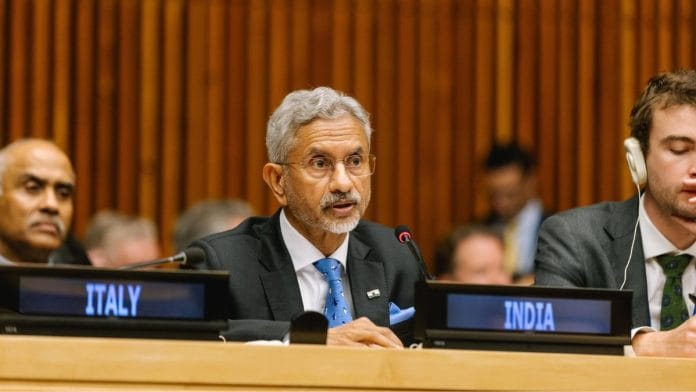New Delhi: External Affairs Minister S. Jaishankar hit out at the US and the European Union (EU) Thursday for their “double standards”, warning that further punitive measures, such as sanctions and tariffs, “cannot facilitate peace”.
Speaking at the G20 Foreign Ministers’ Meeting on the margins of the United Nations General Assembly, he said, “Peace can certainly enable development, but by threatening development we cannot facilitate peace. Making energy and other essentials more uncertain in an economically fragile situation helps no one. Therefore, the way out is to move the needle towards dialogue and diplomacy, not in the opposite direction towards further complications.”
He added that in recent times “international peace and global development” have “deteriorated in parallel”, with large costs to emerging economies, particularly in areas like energy, food and fertiliser security. “Apart from jeopardising supplies and logistics, access and costs themselves became pressure points on nations. Double standards are clearly in evidence,” he said.
The remarks by the Indian External Affairs Minister come as New Delhi has faced increasing scrutiny in recent months for its continued ties with Russia, with particular focus on its energy ties. Last month, the US imposed an additional tariff of 25 percent on Indian imports as a “penalty” for New Delhi’s continued purchase of Russian oil.
Last year, India’s imports of Russian energy touched $56 billion. US President Donald Trump has taken exception to this area of India-Russia ties, calling for New Delhi to reduce its purchases from Moscow. The White House Trade Counsellor Peter Navarro launched a number of broadsides against the Indian government last month, including calling the Russia-Ukraine war “Modi’s war”.
The EU has also promised to unveil more sanctions in near future, with its High Representative for Foreign Affairs Kaja Kallas warning that India’s continued strategic ties with Moscow is an “obstacle for closer ties” last week.
India has bristled with the continued pressure from the West for its ties with Moscow. In a statement last month, New Delhi had highlighted the ongoing trade between the EU and Russia in areas such as oil and gas, as well as fertilisers and mining products. The Ministry of External Affairs had also highlighted the US’ continued trade with Russia, despite Trump’s focus on curbing New Delhi’s ties to Moscow.
On Thursday, Jaishankar suggested that India’s ability to “engage both sides” should be “utilised by the international community” to achieve peace in the ongoing conflicts. New Delhi has maintained ties with both Russia and Ukraine throughout the almost four-year long war, with Prime Minister Narendra Modi travelling to both Moscow and Kyiv last year.
Russian President Vladimir Putin is expected to visit India later this year for the annual bilateral summit between the two countries. While India has been willing to play a constructive role to see an end to the Russia-Ukraine war, it has maintained that the solution is solely a diplomatic one, and that continued conflict would not resolve the situation.
In recent weeks, both the US and the EU have also focussed on China’s continued ties with Russia, calling for Beijing to push for peace in the war.
Ending the Russia-Ukraine war, which began in February 2022, has been a key goal for Trump in his second term in the White House. He had promised to end the conflict within 24 hours while on the campaign trail last year. However, despite holding a summit with Putin in Alaska on 15 August, the movement towards a resolution to the conflict remains stalled.
Despite agreements to partial ceasefires earlier this year, none of the efforts have seen any significant reduction in violence in the war between the two countries. Ukrainian President Volodymyr Zelenskyy has signalled his readiness to agree for an unconditional ceasefire, which could lead to negotiations to an end to the war.
There have also been discussions for a multi-national peacekeeping force for Ukraine that could maintain the peace between Moscow and Kyiv in an eventual scenario where the war is paused. However, there seems to be no slowing down in the intensity of the fighting, with Zelenskyy claiming that Ukrainian forces have retrieved land through an offensive over the last couple of weeks.
(Edited by Mannat Chugh)
Also Read: Trump takes aim at branded pharma products with 100% tariff, unclear on generic drugs for now







Mr Socialist Jaishankar of the socialist Modi govt, burdening Indians with overtaxed fuel to fund socialism also threatens development,